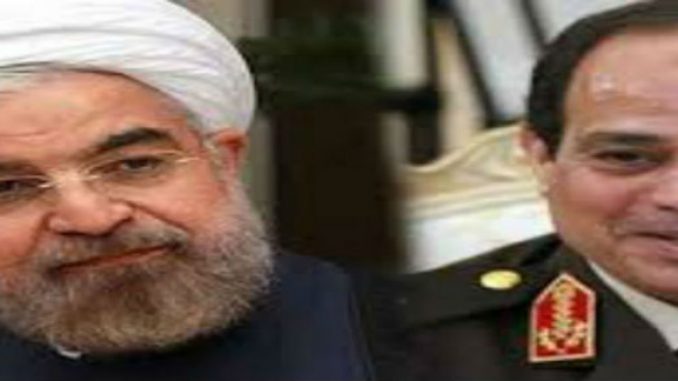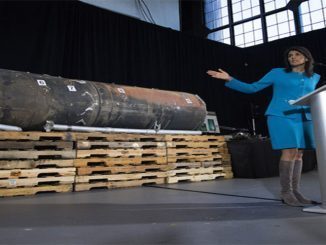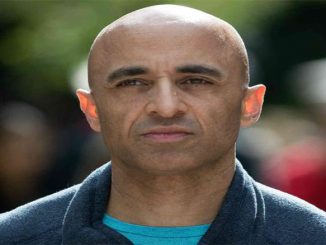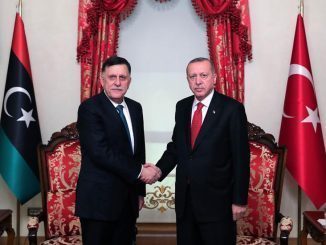
A recent string of diplomatic advances has suggested a warming up of relations between Egypt and Iran
Two weeks ago, Head of Egypt’s Interest Section in Tehran Yasser Othman said that the Cairo and Tehran stances on regional developments are quite close to each other, according to IRNA, the Iranian official News Agency.
Othman made his remarks in a meeting with Head of Iran-Egypt parliamentary friendship group Assadollah Abbasi while expressing his country’s readiness to expand cooperation.
The Egyptian diplomat expressed his pleasure for recent exchanges of visits and welcomed them in direction of creating peace and stability in the region.
Abbasi also said that the two countries have age-old cultural and civilization relations, and said that the world Islamic Ummu(Nation)expects more from Iran and Egypt in direction of creating peace, tranquility and friendship.
He also added that Iran considers Egypt as a big Islamic state, which could play effective role in regional and world scenes, like Iran.
Referring to the current developments in the region, Abbasi said that many Muslim countries like Syria, Yemen, Iraq and Bahrain are under invasion of Takfiri (terrorist)groups, so unity and consolidation of Islamic Umma(Nation) could influence strengthening peace and friendship among Muslim and confrontation with enemies.
Moreover, the two sides also underlined expansion of parliamentary cooperation, especially using parliamentary friendship groups capacities.
Furthermore, the Chairman of the Majlis National Security and Foreign Policy Committee Alaeddin Boroujerdi said that the recent victories over terrorist groups in the region are indebted to Axis of Resistance (an Iran led alliance).
Boroujerdi made this remarks during a meeting with Head of Egypt’s Interest Section in Tehran Yasser Othman.
Boroujerdi said that these victories have disappointed those backing the terrorist groups financially or providing them with military apparatus.
He added that Iran and Egypt with profound historical affinities and cooperation play effective role in resolving regional issues.
He also mentioned that the victories over Daesh should be regarded as a blessing from God which were achieved through resistance and cooperation with the resistance in the region disappointing those backing them financially or militarily and brought them shame.
Boroujerdi also pointed that Iran and Egypt could broaden cooperation in tourism industry.
For his part, Head of Egypt Interest Section in Tehran said that the expansion of relations with Iran plays very significant and key role in the Middle East region.
He added that historical, religious and cultural commonalities between Iran and Egypt have created suitable opportunities for both sides to broaden relations and this should be seized.
He also said that both countries have identical stances in fight against terrorism and use of political means instead of military confrontation in resolving regional crisis.
In the meeting, he also expressed hope to enhance the cooperation between the two countries.
Furthermore, Egyptian Foreign Minister Sameh Shoukry confirmed last week that Iran and Egypt have had diplomatic contacts. However, he refrained from disclosing the content of the talks.
According to Beirut-based TV al-Mayadeen, Shoukry said ,while addressing the Egyptian parliament’s foreign relations committee, that the only problem with Iran is its efforts to expand influence in Arabic countries.
In the past four decades, Egypt and post-revolution Iran have been through strenuous relations.
The two countries cut diplomatic ties in 1979 due to various rival issues ranged from Egypt’s sheltering of Iran’s ousted Shah and Iran’s naming of a street in Tehran after the assassin of late Egyptian President Anwar Sadat.
Later, the tension has intensifies due to more serious issues as Egypt’s support for Saddam Hussein during the first gulf war between Iran and Iraq.
In 2003,there were some limited diplomatic overtures by Iran after reformist President Mohammad Khatami took office when both Khatami and then Egypt’s former President Hosni Mubarak met for the first time in Geneva. However, this did not interpret into full diplomatic relations.
Later, during President Mohamed Morsi’s presidency, he was the first Egyptian president since 1979 to visit to Tehran, but it wasn’t more than an official visit that didn’t result to concrete improvement in the relations between both countries.
Currently, the two countries have diplomatic representation through interest sections.
In this context, Hossein Royvaran, senior Middle East expert and former manager of Iran’s al-Alam Arabic satellite channels said that the time is ripe for a rapprochement between Cairo and Tehran, “Currently, there is a good momentum for better relations between the two countries.”
He said,”Egypt’s foreign policy has become more independent and the new government can create a new atmosphere, and a new situation in the violence-scarred region.”
According to Iranian analysts, Egypt, a close ally of Saudi Arbia, has always been concerned about the Saudi reaction to getting closer to Iran. However, Iranians have recently praised Cairo’s independent foreign policies.
Last October, Egypt voted in favor of a Russian-backed draft resolution in the UN Security Council on Syria, which was opposed by Saudi Arabia.
As a result, Egypt’s stance has angered Egypt’s major Gulf backer which condemned Egypt’s vote and described it with the” painful” stance.
After the voting, the Saudi ambassador to the UN, Abduallah al-Mouallimi, said, “It was painful that the Senegalese and Malaysian stance was closer to the Arab’s consensus than the Egyptian delegation.”
He also said that he feels pity for these countries that voted for the Russian resolution, stressing that his country will continue backing the Syrian people by all means.
Two days following the voting, Saudi state-owned oil company Aramco announced halting oil product supply to Egypt.
On the other side, despite the tensions between Cairo and Riyadh, Iranian officials praised Egypt for its policy towards Syria.
Hossein Amir Abdollahian, a senior advisor to the parliament speaker, praised Egypt for its “constructive and useful” positions on the Syrian crisis and campaign against terrorism last October, as reported by Tehran Times.
Moreover, Royvaran believes that Cairo plays a historic balancing role, as the seat of the highest Sunni authority, at a time where the region already aflame with sectarian tensions, needs at this point.
He said,”The Egyptian government has been able to maintain a balance between respecting its traditional allies – like the Saudis – and at the same time adopting an independent policy and stance in troubled areas like Iraq and Syria, which are close, though not necessarily in the same direction, to Iran’s views and policies.”
In addition, Iran has been strongly supporting Egypt’s active participation in the Syrian peace talks and it also lobbied for the Egyptian foreign minister’s presence as a pre-condition for Lausanne talks on Syria last October.
At a previous time leaked emails revealed by the Guardian showed that Iran had requested the lobbying for Egyptian officials to attend the talks on the Syrian crisis in Lausanne conference.
The Guardian said that it has seen emails indicating that the Iranian foreign minister, Mohammad Javad Zarif, asked Kerry for Cairo’s team to attend the Lausanne talks. When the US secretary of state proposed six-nation talks to “see if a new reasonableness can manifest itself” in Syria, Zarif replied: “Why not Egypt too?”
Iran agreed to attend the talks only once it had secured places for the foreign ministers of Egypt and Iraq at the discussions, according to the Guardian.
According to Royvaran, Iran’s strong support for Egypt’s participation in Lausanne conference on Syria shows that it has recognized Egypt as a stabilizing power in the region which shouldn’t be marginalized.”
In addition, last May,the Egyptian authorities initially gave the green light to Iranian oil exports through Sumed, but failed to finalize the deal. The pipeline would enable Iran to increase its exports to the Mediterranean and southern Europe with the capacity of 2.5m barrels a day.
In the past few months, there were various speculation regarding oil and petrochemical shipments expected to be dispatched to Egypt after a long halt.
But talks are under way to get Egypt’s approval to start exporting Iranian oil – through Sumed pipeline- to the European countries.
Few days ago, the Iranian Petroleum ministry’s website quoted Oil Minister Bijan Namdar Zanganeh saying,”Iran pursues negotiation with countries who are not necessarily Iranian friends to resolve issues”, which was an apparent reference to the Egyptian transit pipeline.
The negotiations are run by a group of former Iranian diplomats, according to Iranian Diplomacy website.
It is worth to mention that Tehran advocated and helped in striking oil deal between Egypt and Iraq in February.
In addition, experts in Iran’s flourishing tourism industry, which has been steadily growing after the Iran Nuclear Deal, believe that oil diplomacy between Tehran and Cairo should spread into other sectors, especially tourism.
They believe that both Tehran and Cairo can build a billion-dollar business around it, given the rich cultural heritage the two countries share.
Recently,the head of tourism department said that Iran received 5.2 million tourists in 2015 and “numbers show there has been 50 %growth in incoming tourists in the past 10 months”.
However, despite the increasing backstage talks between the two countries, analysts remain skeptical that both countries would re-establish a full diplomatic relationship anytime soon due to the complicated nature of issues at stake.
Last week, despite the Iran’s self-sufficient agricultural industry and enormous production of fruits and vegetables,Iran’s commerce ministry issued a decision that permit to import Egyptian oranges.
The move was interpreted by local media reports as strengthening business ties with Egyptians.
Mosayyeb Naimi, editor-in-chief of Iran’s Arabic language daily al-Wifaq, said “Cairo’s concerns and difficulties for resumption of diplomatic ties with Tehran is much more serious.”
Naimi believes that the backstage talks that the Egyptian foreign minister has recently confirmed are not rare but that the two countries’ efforts to reach a thaw in the relations have been constantly thwarted by some regional countries.
Naimi said,”Many regional countries won’t let Cairo experience some sort of reconciliation with Tehran,” he added,”Cairo and Tehran’s relations have been an exception in the region. There are countries which have had extensive business and diplomatic ties with Tehran despite being critical of Tehran’s regional policies, so why shouldn’t Cairo do the same thing?”
According to Naimi, a simple answer lies in regional rivalry. “In essence, it is quite possible that Egypt and Iran would re-establish lucrative business ties, but this has been hampered by other actors.”
In this context, will Egypt’s al-Sisi overcome the regional rivalry as he has already become more involved in the Russian axis in many regional issues as the Syrian crisis as well as the Libyan crisis ?
Al-Sisi has already broken the Arab consent with his rapprochement with Russian in backing the Syrian Shi’ite regime that constitute a real threat to the Sunni Arab lebensraum.
Accordingly, the delay of resuming the diplomatic ties between Egypt and Iran would only be a matter of time as both countries already admitted that they have close stances towards regional issues.



